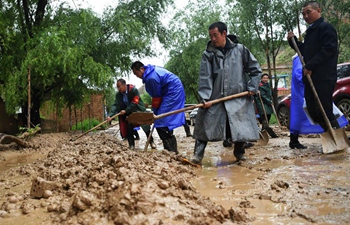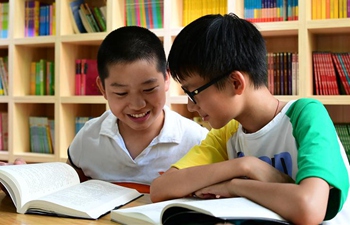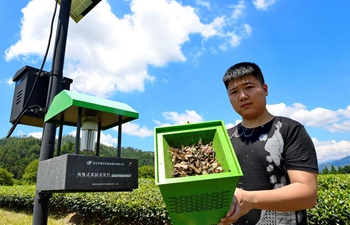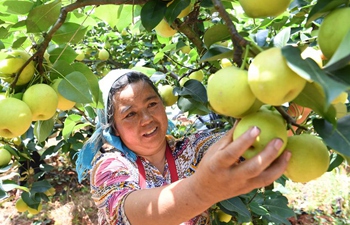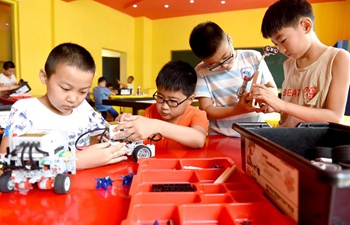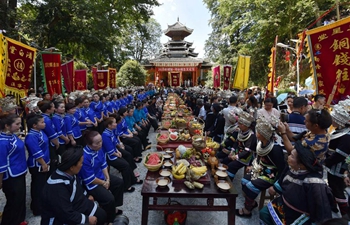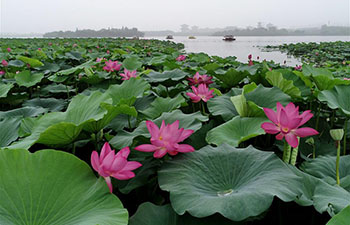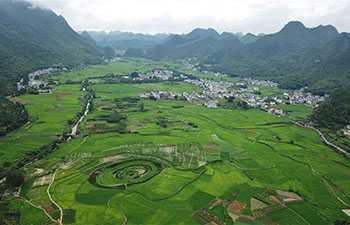GUANGZHOU, July 21 (Xinhua) -- For 16 years, Mouhamadou Moustapha Dieng, a Senegalese businessman, has been living in Guangzhou, capital of Guangdong Province, exporting Chinese commodities from China to Africa.
But now he plans to open a packaging factory in Senegal and bring his home country's products to China.
In early July, he visited a factory in Wuxi City in east China's Jiangsu Province and planned to introduce its bottling production line to Senegal.
"We have many good products, but it's hard to export them because we lack packaging technology," said Dieng.
GOLD RUSH ERA
Dieng was among the tens of thousands of African business people who have flocked to Guangzhou over the past four decades. The city has become the heartland of Sino-African trade since China's reform and opening up 40 years ago.
In 2002, Dieng, then a trader based in Bangkok, Thailand, first visited Guangzhou, to attend the China Import and Export Fair, commonly known as the Canton Fair. He was amazed by the cheap but high-quality Chinese commodities.
Two months after the visit, he moved both his family and business from Bangkok to Guangzhou.
In the beginning, Dieng rented a 70-square-meter apartment in Guangzhou to accommodate his family and set up his trading company. The living room was transformed into a showroom packed with a wide variety of merchandise, ranging from garments to home appliances. The company was named "Teranga," meaning "hospitality" in Senegal's local language, Wolof.
By purchasing goods for his clients at lower prices, Dieng earned fame and profit. His business boomed and expanded.
From 2006 to 2010, Dieng's company shipped an average of some 150 containers from China to Senegal per month, with merchandise in each container worth around 1 million yuan (about 147,800 U.S. dollars).
"A container is like a supermarket. It has all kinds of goods ranging from jeans to motorcycles," he said.
ERA OF CHANGE AND NEW OPPORTUNITIES
Dieng's business has experienced tough times in the past four years, with rising labor costs and commodity prices.
Some of his fellow African traders have returned to Africa, while others have chosen to seek their opportunities in east China's Yiwu, east China's Zhejiang Province, where the world's largest small commodity market is located.
"Those who remain in Guangzhou need to make a change," Dieng concluded.
Dieng's company, Teranga Trading Co., Ltd, has now shifted its focus from exporting commodities to logistics. His company is helping other traders, including Chinese ones, ship commodities from China to Africa. Dieng also owns large warehouses in Guangzhou and Foshan, also in Guangdong.
The company's office no longer displays miscellaneous commodities, but a poster of an oceangoing freighter and models of containers and excavators.
Dieng's company has also witnessed a change in the commodities shipped from Guangzhou to Africa. The amount of smartphone accessories, LCD televisions and building materials has seen sustained growth, while that of sneakers, hats, and garments has decreased.
High-tech products, such as solar-powered refrigerators, are more popular with today's African consumers, said Dieng.
The era of change has also brought new opportunities, as many African business people hope the China-proposed Belt and Road Initiative will usher in a new golden age for Sino-African trade.
"China has provided African countries with opportunities to boost their development. This is more meaningful than simply buying low and selling high," he said.
Customs data showed bilateral trade volume between China and African countries reached 170 billion U.S. dollars last year, up 14.1 percent year on year. In breakdown, Chinese exports to Africa rose 2.7 percent to 94.74 billion U.S. dollars, while Chinese imports from Africa surged 32.8 percent to 75.26 billion U.S. dollars.
Besides opening a packaging factory in Senegal, Dieng also plans to send his 17-year-old son, who is learning Chinese in a Confucius Institute in Senegal, to study at a Chinese university.
"Computer Sciences at Tsinghua University might be a good choice," he said.
